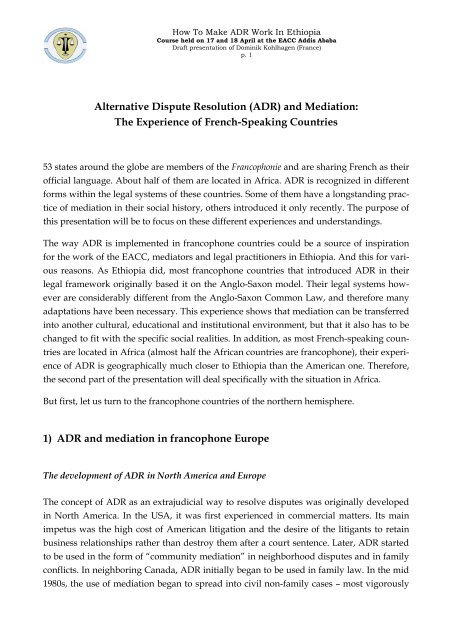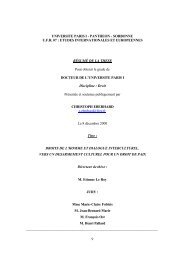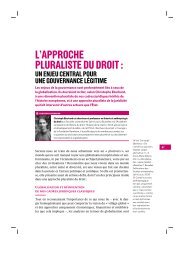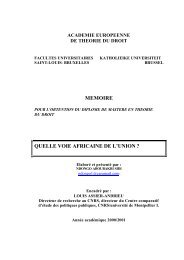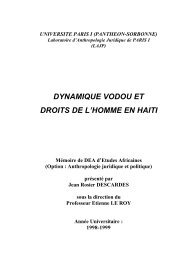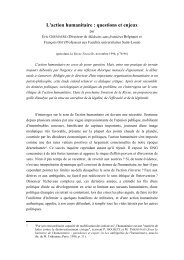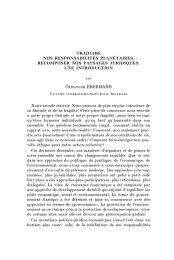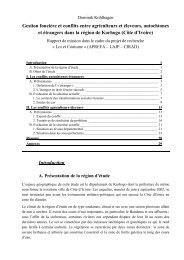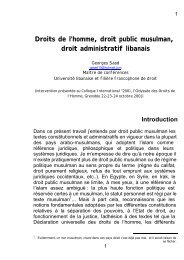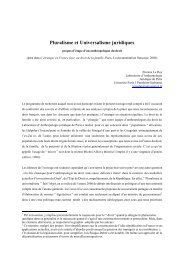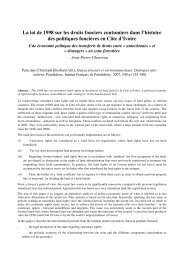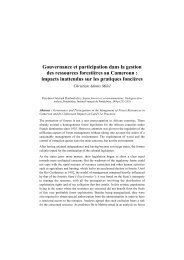(ADR) in Africa - Droits de l'Homme et Dialogue Interculturel - Free
(ADR) in Africa - Droits de l'Homme et Dialogue Interculturel - Free
(ADR) in Africa - Droits de l'Homme et Dialogue Interculturel - Free
Create successful ePaper yourself
Turn your PDF publications into a flip-book with our unique Google optimized e-Paper software.
How To Make <strong>ADR</strong> Work In EthiopiaCourse held on 17 and 18 April at the EACC Addis AbabaDraft presentation of Dom<strong>in</strong>ik Kohlhagen (France)p. 1Alternative Dispute Resolution (<strong>ADR</strong>) and Mediation:The Experience of French-Speak<strong>in</strong>g Countries53 states around the globe are members of the Francophonie and are shar<strong>in</strong>g French as theirofficial language. About half of them are located <strong>in</strong> <strong>Africa</strong>. <strong>ADR</strong> is recognized <strong>in</strong> differentforms with<strong>in</strong> the legal systems of these countries. Some of them have a longstand<strong>in</strong>g practiceof mediation <strong>in</strong> their social history, others <strong>in</strong>troduced it only recently. The purpose ofthis presentation will be to focus on these different experiences and un<strong>de</strong>rstand<strong>in</strong>gs.The way <strong>ADR</strong> is implemented <strong>in</strong> francophone countries could be a source of <strong>in</strong>spirationfor the work of the EACC, mediators and legal practitioners <strong>in</strong> Ethiopia. And this for variousreasons. As Ethiopia did, most francophone countries that <strong>in</strong>troduced <strong>ADR</strong> <strong>in</strong> theirlegal framework orig<strong>in</strong>ally based it on the Anglo-Saxon mo<strong>de</strong>l. Their legal systems howeverare consi<strong>de</strong>rably different from the Anglo-Saxon Common Law, and therefore manyadaptations have been necessary. This experience shows that mediation can be transferred<strong>in</strong>to another cultural, educational and <strong>in</strong>stitutional environment, but that it also has to bechanged to fit with the specific social realities. In addition, as most French-speak<strong>in</strong>g countriesare located <strong>in</strong> <strong>Africa</strong> (almost half the <strong>Africa</strong>n countries are francophone), their experienceof <strong>ADR</strong> is geographically much closer to Ethiopia than the American one. Therefore,the second part of the presentation will <strong>de</strong>al specifically with the situation <strong>in</strong> <strong>Africa</strong>.But first, l<strong>et</strong> us turn to the francophone countries of the northern hemisphere.1) <strong>ADR</strong> and mediation <strong>in</strong> francophone EuropeThe <strong>de</strong>velopment of <strong>ADR</strong> <strong>in</strong> North America and EuropeThe concept of <strong>ADR</strong> as an extrajudicial way to resolve disputes was orig<strong>in</strong>ally <strong>de</strong>veloped<strong>in</strong> North America. In the USA, it was first experienced <strong>in</strong> commercial matters. Its ma<strong>in</strong>imp<strong>et</strong>us was the high cost of American litigation and the <strong>de</strong>sire of the litigants to r<strong>et</strong>a<strong>in</strong>bus<strong>in</strong>ess relationships rather than <strong>de</strong>stroy them after a court sentence. Later, <strong>ADR</strong> startedto be used <strong>in</strong> the form of “community mediation” <strong>in</strong> neighborhood disputes and <strong>in</strong> familyconflicts. In neighbor<strong>in</strong>g Canada, <strong>ADR</strong> <strong>in</strong>itially began to be used <strong>in</strong> family law. In the mid1980s, the use of mediation began to spread <strong>in</strong>to civil non-family cases – most vigorously
How To Make <strong>ADR</strong> Work In EthiopiaCourse held on 17 and 18 April at the EACC Addis AbabaDraft presentation of Dom<strong>in</strong>ik Kohlhagen (France)p. 2<strong>in</strong> personal <strong>in</strong>jury cases. Some fe<strong>de</strong>ral states, like Québec, today require mediation <strong>in</strong> anyfamily law case before an issue of custody or access can go to the courts.In most parts of Europe, particularly <strong>in</strong> the UK, mediation was <strong>in</strong>troduced from the USA.The major francophone countries, France, Belgium and Switzerland, however took it overfrom Québec. This is probably the reason why it was first experienced <strong>in</strong> family law. Anearly, very <strong>in</strong>fluential advocate for family mediation was sociologist Annie Babu who atten<strong>de</strong>da course <strong>in</strong> mediation <strong>in</strong> Québec. She lobbied strongly for family mediation amongwelfare associations and <strong>in</strong> April 1988 persua<strong>de</strong>d family law professionals <strong>in</strong> a number ofEuropean countries to form an organization to promote mediation: the “Association forthe Promotion of Family Mediation” (APMF). In the follow<strong>in</strong>g years, several family mediationservices were created, which, <strong>in</strong> 1991, established an umbrella organisation: the“National Committee of Associations and Services of Family Mediation” (FENAMEF). TheAPMF and the FENAMEF today still exist and have contributed consi<strong>de</strong>rably to the fast<strong>de</strong>velopment of <strong>ADR</strong> <strong>in</strong> francophone Europe.From the very first, mediation associations and mediators had two ma<strong>in</strong> aims for theirnew profession: professionalization and legalization. With regard to professionalization,they lobbied for the creation of a recognized state diploma for arbitrators. They alsoworked out a co<strong>de</strong> of conduct.Legal recognition of mediation <strong>in</strong> francophone Europe started <strong>in</strong> the early 1990s. A huge<strong>in</strong>crease <strong>in</strong> the number of divorces <strong>in</strong> the 1980s and the concern of public authorities of thecost of these procedures was one important factor for a rapid <strong>in</strong>troduction of mediation<strong>in</strong>to civil law procedures.Mediation <strong>in</strong> French lawIn France, mediation was formally recognized by the Loi No 95-125 of 18 February 1995which ad<strong>de</strong>d articles 131-1 to 131-15 to the New Co<strong>de</strong> of Civil Procedure [reproduced <strong>in</strong>French <strong>in</strong> the jo<strong>in</strong>t documents]. Un<strong>de</strong>r this law, a judge hear<strong>in</strong>g a matter can appo<strong>in</strong>t athird person for up to three months with the consent of the parties. If the mediator requestsit, another three months may be granted. The mediation may apply to part or thewhole of a matter and the judge can stop the mediation at any time if the mediator or eitherparty requests it. Mediation is always optional.The mediator’s remuneration is s<strong>et</strong> by the judge and is the responsibility of the partieswho must make a provisional payment at the start of the procedure. Impecunious partiesare eligible for legal aid.
How To Make <strong>ADR</strong> Work In EthiopiaCourse held on 17 and 18 April at the EACC Addis AbabaDraft presentation of Dom<strong>in</strong>ik Kohlhagen (France)p. 3When mediation takes place out of court, there are no general regulations govern<strong>in</strong>g it.Judicial conciliation <strong>in</strong> French lawBesi<strong>de</strong> mediation, conciliation has existed long time before as another alternative way toresolve disputes <strong>in</strong> France. It is organized <strong>in</strong> sections 831 to 835 of the New Co<strong>de</strong> of CivilProcedure. S<strong>in</strong>ce the <strong>in</strong>troduction of mediation by the Loi No 95-125, the m<strong>et</strong>hodologicaldist<strong>in</strong>ction b<strong>et</strong>ween mediation and conciliation rema<strong>in</strong>s quite unclear <strong>in</strong> French law. Thedifference is ma<strong>in</strong>ly procedural.Unlike mediation, conciliation is a free service. Conciliators are no professionals. They arevoluntary legal assistants registered on a list drawn up by the First Presi<strong>de</strong>nt of the Courtof Appeal follow<strong>in</strong>g a proposal by the Court of first <strong>in</strong>stance.There are two mechanisms:• The prelim<strong>in</strong>ary attempt at conciliation before the court of first <strong>in</strong>stance and thelocal court: the applicant applies orally or <strong>in</strong> writ<strong>in</strong>g to the clerk of the court’s office.The clerk of the court calls the parties tog<strong>et</strong>her by means of an ord<strong>in</strong>ary l<strong>et</strong>ter. If theconciliation is successful, the report, signed by the parties, the judge and the clerk ofthe court, is legally b<strong>in</strong>d<strong>in</strong>g. In the absence of conciliation, the case may either beheard immediately if the parties agree, or there may be a summary or a <strong>de</strong>clarationto the court office, <strong>de</strong>pend<strong>in</strong>g on the seriousness of the claim and the nature of thedispute. In practice conciliation hear<strong>in</strong>gs are held before a judge <strong>in</strong> most courts offirst <strong>in</strong>stance.• Conciliation or<strong>de</strong>red dur<strong>in</strong>g the legal proceed<strong>in</strong>g with the consent of the parties:the court of first <strong>in</strong>stance or local court may, with the consent of the parties, appo<strong>in</strong>ta conciliator to attempt a conciliation. He s<strong>et</strong>s the duration of this mission, whichmay not exceed one month but which may be renewed once only. The conciliatorreceives the parties <strong>in</strong> compl<strong>et</strong>e confi<strong>de</strong>ntiality. In the event of a memorandum ofagreement be<strong>in</strong>g produced, it must be submitted for the judge’s approval. In theevent of failure, the proceed<strong>in</strong>gs resume their course once more.The law on guidance and plann<strong>in</strong>g for legal proceed<strong>in</strong>gs allows the court of first <strong>in</strong>stanceand the local court to or<strong>de</strong>r the parties to me<strong>et</strong> a conciliator to <strong>in</strong>form them about the aimsand procedures of the conciliation process.
How To Make <strong>ADR</strong> Work In EthiopiaCourse held on 17 and 18 April at the EACC Addis AbabaDraft presentation of Dom<strong>in</strong>ik Kohlhagen (France)p. 4Out of court conciliation and French lawOut of court, the parties may resort to conciliation before a legal conciliator if their disputeconcerns rights that they are free to exercise. The conciliators receive the parties, who mayhave assistance. They act <strong>in</strong> compl<strong>et</strong>e confi<strong>de</strong>ntiality; that is to say the reports and <strong>de</strong>clarationsthat they obta<strong>in</strong> may not be produced or cited later <strong>in</strong> subsequent proceed<strong>in</strong>gs withoutthe consent of the parties. The memorandum of agreement may become legally enforceableif the parties ask the presid<strong>in</strong>g judge of a court of first <strong>in</strong>stance to or<strong>de</strong>r this (section1441-4 of the New Co<strong>de</strong> of Civil Procedure). These agreements therefore have thesame legal force as a judgment. In other cases, the agreement will have the same value as acontract b<strong>et</strong>ween the parties. If the agreement is not enforced, the party so requir<strong>in</strong>g maybr<strong>in</strong>g the dispute before the judge.Arbitration <strong>in</strong> French lawArbitration <strong>in</strong> civil and commercial affairs is ma<strong>in</strong>ly organized <strong>in</strong> sections 1442 to 1491 ofthe New Co<strong>de</strong> of Civil Procedure. Unless the litigants did not convene on it, arbitrators arerelatively free to fix the arbitration procedure. They have important rights to exercise their<strong>in</strong>struction and are assimilated <strong>in</strong> many regards to regular magistrates. The arbitrationsentence is legally enforceable. Appeals are possible before the ord<strong>in</strong>ary courts of appeal.Particular cases of <strong>ADR</strong> mechanisms <strong>in</strong> French lawBesi<strong>de</strong> the general provisions on conciliation, mediation and arbitration, various compulsoryor optional extrajudicial conflict s<strong>et</strong>tlement mechanisms exist <strong>in</strong> French law for particulartypes of diputes.• Conflicts b<strong>et</strong>ween employers and employees have to be submitted to a conciliationbureau before be<strong>in</strong>g <strong>de</strong>alt with by the Industrial Tribunal, the Conseil <strong>de</strong>Prud’Hommes. The procedure is regulated by sections L 511-1 and R 516 onwards ofthe Employment Co<strong>de</strong>. If the parties reach an agreement, it is written up <strong>in</strong> an officialreport. If they fail to agree, the procedure cont<strong>in</strong>ues before the tribunal.• Conflicts b<strong>et</strong>ween landlords and tenants can be submitted to a conciliation commission<strong>de</strong>al<strong>in</strong>g with matters relat<strong>in</strong>g to leases on dwell<strong>in</strong>gs. It is compulsory to refera matter to this commission before tak<strong>in</strong>g it before a court when the dispute relatesto rental prices. There is no charge for this procedure. Any dispute regard<strong>in</strong>gthe condition of the premises, guarantee <strong>de</strong>posits, charges and repairs may also be
How To Make <strong>ADR</strong> Work In EthiopiaCourse held on 17 and 18 April at the EACC Addis AbabaDraft presentation of Dom<strong>in</strong>ik Kohlhagen (France)p. 5referred to this commission. The work<strong>in</strong>gs of this commission are regulated by DecreeNo 2001-653 of 19 July 2001. Where commercial leases are concerned, there aresimilar commissions, referral to which is always optional.• For conflicts b<strong>et</strong>ween consumer and bus<strong>in</strong>ess, there is a structure for extrajudicialdispute s<strong>et</strong>tlement, put <strong>in</strong> place by the French authorities: the Direction générale <strong>de</strong> laConcurrence, <strong>de</strong> la Consommation <strong>et</strong> <strong>de</strong> la Répression <strong>de</strong>s Frau<strong>de</strong>s (Office of Comp<strong>et</strong>ition,Consumer Affairs and Fraud Prevention). This is a one-stop shop provid<strong>in</strong>g <strong>in</strong>formationand guidance to consumers and help<strong>in</strong>g to s<strong>et</strong>tle consumer-related disputes.It br<strong>in</strong>gs tog<strong>et</strong>her on a département level consumers’ associations, professional organizationsand the adm<strong>in</strong>istration. This mechanism is free of charge.• Where <strong>in</strong>surance is concerned, groups of <strong>in</strong>surance companies have drawn upmediation charters through which an <strong>in</strong><strong>de</strong>pen<strong>de</strong>nt mediator gives an op<strong>in</strong>ion on adispute b<strong>et</strong>ween <strong>in</strong>sured and <strong>in</strong>surer. A matter may be referred by l<strong>et</strong>ter to thismediator who is bound by the adversarial system. If mediation fails, the case maybe referred to the courts with<strong>in</strong> a period of two years start<strong>in</strong>g from the act that wasthe orig<strong>in</strong>al cause of the dispute.• In matters <strong>in</strong>volv<strong>in</strong>g banks, section L 312-1-3 of the Mon<strong>et</strong>ary and F<strong>in</strong>ancial Co<strong>de</strong>aims to <strong>in</strong>stitutionalize and extend the practice of the bank mediator. The procedureis free of charge and the mediator must give a rul<strong>in</strong>g with<strong>in</strong> two months of the matterbe<strong>in</strong>g referred to him; limitation periods are suspen<strong>de</strong>d dur<strong>in</strong>g this time.<strong>ADR</strong> <strong>in</strong> European Community LawIn addition to these national legal dispositions, a proposal for a directive on mediation iscurrently discussed <strong>in</strong> the European Union. The proposal seeks to further the use of mediationby mak<strong>in</strong>g certa<strong>in</strong> legal rules available with<strong>in</strong> the legal systems of all memberstates. These rules cover the areas of confi<strong>de</strong>ntiality of the mediation process and of mediatorsas witnesses, enforcement of agreements for s<strong>et</strong>tl<strong>in</strong>g disputes as a result of a mediation,the suspension of the runn<strong>in</strong>g of periods of prescription and limitation of actionswhile a mediation is <strong>in</strong> process. It encourages the tra<strong>in</strong><strong>in</strong>g of mediators and the adoptionof norms of conduct to secure the quality of mediation on a consistent basis throughoutthe Union.A European co<strong>de</strong> of conduct has already been elaborated <strong>in</strong> co-operation with a largenumber of organisations and practitioners of mediation. The co<strong>de</strong> was adopted by a me<strong>et</strong><strong>in</strong>g<strong>in</strong>volv<strong>in</strong>g these experts <strong>in</strong> July 2004 and shall serve as a mo<strong>de</strong>l for all member states.
How To Make <strong>ADR</strong> Work In EthiopiaCourse held on 17 and 18 April at the EACC Addis AbabaDraft presentation of Dom<strong>in</strong>ik Kohlhagen (France)p. 6<strong>ADR</strong> <strong>in</strong> francophone Europe: f<strong>in</strong>al remarksWith<strong>in</strong> 10 to 15 years, <strong>ADR</strong> has become an important element of the European legal systems.In comparison to long and cost-<strong>in</strong>tensive procedures before court, its advantages aregenerally perceived as follows:• preservation of exist<strong>in</strong>g relationships;• arrangements may be ma<strong>de</strong> quickly; process usually takes one day or less;• simple and easy process;• confi<strong>de</strong>ntiality;• process non-b<strong>in</strong>d<strong>in</strong>g; the outcome is with<strong>in</strong> the control of the parties;• high level of satisfaction.2) <strong>ADR</strong> and mediation <strong>in</strong> francophone <strong>Africa</strong>L<strong>et</strong>’s now turn to <strong>Africa</strong>. About 25 countries, that’s half of all <strong>Africa</strong>n nations, share theFrench legal system as their official legal system. The social context <strong>in</strong> these countrieshowever is consi<strong>de</strong>rably different from the European or the American one. Like <strong>in</strong> Ethiopia,the official legal system there is part of a very complex system of social regulation.Besi<strong>de</strong> state law, which has only been <strong>in</strong>troduced un<strong>de</strong>r colonial occupation about 100years ago, there is a great vari<strong>et</strong>y of traditional legal mechanisms that still coexist with theofficial law.The concept of “<strong>ADR</strong>”, un<strong>de</strong>rstood as “alternative dispute resolution”, has been <strong>de</strong>velopedas an “alternative” to law <strong>in</strong> nations which only know one s<strong>in</strong>gle legal system. It hasnecessarily to be revisited to be operational <strong>in</strong> countries where such an “alternative” alreadyexisted from the beg<strong>in</strong>n<strong>in</strong>g on.Some <strong>in</strong>troductory anthropological consi<strong>de</strong>rations will be helpful to un<strong>de</strong>rstand the mean<strong>in</strong>gand the importance of <strong>ADR</strong> <strong>in</strong> the <strong>Africa</strong>n context.<strong>ADR</strong> <strong>in</strong> <strong>Africa</strong>: An anthropological approachWith regard to state law, the specificity of <strong>ADR</strong> is to achieve conflict resolution through anegotiated solution that, <strong>in</strong> the end, is acceptable for all conflict<strong>in</strong>g parties. In the USA, its<strong>de</strong>velopment was very much encouraged by legal anthropologists who based their recommendationson observations ma<strong>de</strong> <strong>in</strong> soci<strong>et</strong>ies that already knew such regulationmechanisms. Many of these observations were ma<strong>de</strong> <strong>in</strong> <strong>Africa</strong>.
How To Make <strong>ADR</strong> Work In EthiopiaCourse held on 17 and 18 April at the EACC Addis AbabaDraft presentation of Dom<strong>in</strong>ik Kohlhagen (France)p. 7To un<strong>de</strong>rstand and implement <strong>in</strong>stitutionalized <strong>ADR</strong> <strong>in</strong> a non-Western context, it is importantto re-contextualize these research f<strong>in</strong>d<strong>in</strong>gs from an <strong>Africa</strong>n – or at least a crosscultural– perspective. For this purpose, some <strong>in</strong>terest<strong>in</strong>g works of French legal anthropologistsare worth mention<strong>in</strong>g. Try<strong>in</strong>g to classify the different conceptions of law thatexist <strong>in</strong> the world, they dist<strong>in</strong>guish three ma<strong>in</strong> ways to conceive social and legal or<strong>de</strong>r:• Imposed or<strong>de</strong>r (“ordre imposé”): social regulation is based on general and impersonalrules. This abstract way to <strong>de</strong>f<strong>in</strong>e law is a traditional characteristic of monotheisticsoci<strong>et</strong>ies and the foundation of those legal systems that today are generallyconsi<strong>de</strong>red as “mo<strong>de</strong>rn”. “Law” <strong>in</strong> these legal systems is un<strong>de</strong>rstood as a s<strong>et</strong> ofrules.• Negotiated or<strong>de</strong>r (“ordre négocié”): conflict resolution is achieved through commonnegotiation of a solution, with<strong>in</strong> the family or the group <strong>in</strong> which the disputearose. There are only few nonnegotiable and abstractly fixed rules; each dispute canbe a moment of re<strong>de</strong>f<strong>in</strong>ition of what is “good” and “just”. To ensure a social cont<strong>in</strong>uity,experienced el<strong>de</strong>rs and persons who are consi<strong>de</strong>red as a notables have animportant role. This conception is privileged <strong>in</strong> most <strong>Africa</strong>n customs.• Accepted or<strong>de</strong>r (“ordre accepté”): life <strong>in</strong> soci<strong>et</strong>y is based on the i<strong>de</strong>al to avoid conflicts.What is consi<strong>de</strong>red as “good” and as “or<strong>de</strong>r” is a general consensus on socialbehavior. If nevertheless a dispute arises and is taken to a public place, the situationis socially perceived as a <strong>de</strong>feat for both parties <strong>in</strong>volved. This conception canma<strong>in</strong>ly be found <strong>in</strong> Confucian Asia.Follow<strong>in</strong>g this classification, <strong>ADR</strong> has to be situated somewhere b<strong>et</strong>ween “accepted” and“negotiated” or<strong>de</strong>r. It is only an “alternative” to the “imposed” or<strong>de</strong>r of state law, butcannot properly be consi<strong>de</strong>red as such <strong>in</strong> soci<strong>et</strong>ies where similar dispute resolutionmechanisms already exist. For this reason, the <strong>de</strong>nom<strong>in</strong>ation “appropriated dispute resolution”will be favored for the rest of this presentation. The question <strong>in</strong> <strong>Africa</strong> is not so muchhow to <strong>de</strong>f<strong>in</strong>e an “alternative” to state law, but how to <strong>in</strong>tegrate state law with sociallymore “appropriate” systems that already exist.“Appropriated dispute resolution” and state law <strong>in</strong> francophone <strong>Africa</strong>From this perspective, the recognition of <strong>ADR</strong> appears to have been a steady concern forlegal scholars and practitioners <strong>in</strong> francophone <strong>Africa</strong> over the past 100 years. S<strong>in</strong>ce the<strong>in</strong>troduction of French and Belgian state law un<strong>de</strong>r colonial occupation, the <strong>in</strong>tegration ofcustomary conceptions has always been perceived as an important mean to reconcile the
How To Make <strong>ADR</strong> Work In EthiopiaCourse held on 17 and 18 April at the EACC Addis AbabaDraft presentation of Dom<strong>in</strong>ik Kohlhagen (France)p. 8official law with social realities. The progressive creation of “customary courts” and thecodification of “customary law” were two major priorities of colonial policies. However,this process also <strong>in</strong>ten<strong>de</strong>d to g<strong>et</strong> b<strong>et</strong>ter control over traditional authorities and was, to alarge extend, politically motivated. Furthermore, what had to be un<strong>de</strong>rstood as “customarylaw” was generally <strong>de</strong>f<strong>in</strong>ed by anthropologists, missionaries or lawyers from Franceand Belgium. Their misun<strong>de</strong>rstand<strong>in</strong>g of local hierarchies and legal mechanisms led to agap b<strong>et</strong>ween the recognized “customary law” and the actual local legal practice.After <strong>in</strong><strong>de</strong>pen<strong>de</strong>nce, almost all francophone countries abolished their “customary courts”.This policy however was not only due to the fact that these courts did not really reflect“customary” conceptions of law. It was ma<strong>in</strong>ly motivated by the aim to promote the civillaw system as the s<strong>in</strong>gle one. Implicitly, customary legal conceptions were thought to vanishover the time. Half a century later however, the importance of non-state law rema<strong>in</strong>svery important all over the <strong>Africa</strong>n cont<strong>in</strong>ent.The official recognition of <strong>ADR</strong> has thus become a priority aga<strong>in</strong> for many legal reformprojects. Some of these <strong>in</strong>itiatives (that frequently do not use the term “<strong>ADR</strong>”) have beenpresented <strong>in</strong> a recent report of the French Embassy <strong>in</strong> Addis Ababa (Dom<strong>in</strong>ik Kohlhagen,“State Law and Local Law <strong>in</strong> sub-Saharan <strong>Africa</strong>”, 2005). In conclusion to this report, Ihave i<strong>de</strong>ntified six different ways to give recognition to <strong>ADR</strong> <strong>in</strong> sub-Saharan <strong>Africa</strong> (excerptfrom pp. 21-22):• Codification of local conceptions of law has been favored by many francophone countriesand some common law countries like Tanzania. This procedure has the advantage to provi<strong>de</strong>accessible and reliable documents that can be used <strong>in</strong> a written law procedure. Its problem isthat it does not take <strong>in</strong>to account the dynamics and flexibility of most local legal systemswhich prefer negotiation to the strict application of a s<strong>et</strong> of rules.• Integration of local law <strong>in</strong>to the state legal system <strong>in</strong> a non-written form as practiced <strong>in</strong>Ghana or <strong>in</strong> some francophone countries limits the risk of <strong>in</strong>appropriate <strong>de</strong>term<strong>in</strong>ation offixed rules. It requires the nom<strong>in</strong>ation of assessors <strong>in</strong> court and is a quite easy and practicableway to adjust the law to local customs and practices. However, as the experience of thecountries mentioned shows, its impact is limited because it does not ren<strong>de</strong>r the structure ofthe judiciary more accessible for people who are not familiar with it.• Incorporation of local <strong>in</strong>stitutions <strong>in</strong>to the state legal systems without codification ofprocedures and the law they use has been practiced un<strong>de</strong>r the British “<strong>in</strong>direct rule”. Thisway presumes not only that a<strong>de</strong>quate <strong>in</strong>stitutions actually exist but also that their logics offunction<strong>in</strong>g are compatible with state law. It requires an important knowledge of the real
How To Make <strong>ADR</strong> Work In EthiopiaCourse held on 17 and 18 April at the EACC Addis AbabaDraft presentation of Dom<strong>in</strong>ik Kohlhagen (France)p. 9impact well specified <strong>in</strong>stitutions have <strong>in</strong> well specified regions and represents a risk for m<strong>in</strong>oritiesand socially marg<strong>in</strong>alized groups.• Tolerated self-regulation is probably the <strong>de</strong> facto situation <strong>in</strong> most <strong>Africa</strong>n countrieswhere extra-legal mechanisms of social regulation are known and tolerated by the state’s <strong>in</strong>stitutions.• Cooperation <strong>in</strong> a more explicit manner is practiced with the Bash<strong>in</strong>gantahe <strong>in</strong> Burundiand <strong>in</strong> Mozambique, where the Community Courts are now recognized as conciliationboards without be<strong>in</strong>g part of the state judiciary. The risks of this procedure are the same asthose of <strong>in</strong>corporation, but it provi<strong>de</strong>s a greater flexibility. The exercise of partial comp<strong>et</strong>encescan be recognized as be<strong>in</strong>g assumed by certa<strong>in</strong> extra-legal forums without be<strong>in</strong>g subjectto control by the state. Outsi<strong>de</strong> <strong>Africa</strong>, this option is presently experienced quite successfully<strong>in</strong> the Nunavut region of Canada or <strong>in</strong> Greenland.• Innovation, like the rehabilitation of traditional dispute s<strong>et</strong>tlement mechanisms <strong>in</strong> Rwandaor the creation of new <strong>in</strong>stitutions <strong>in</strong>tegrat<strong>in</strong>g locally recognized authorities <strong>in</strong> post<strong>in</strong><strong>de</strong>pen<strong>de</strong>nceMozambique and <strong>in</strong> Uganda, is another possible way. At the moment, thispossibility has only been chosen on the background of very specific historical or i<strong>de</strong>ologicalexperiences.As this summary shows, the recognition of “appropriate dispute resolution” by the officiallegal system is <strong>de</strong>alt with <strong>in</strong> many different ways <strong>in</strong> francophone <strong>Africa</strong>.Institutional mediation, conciliation and arbitration <strong>in</strong> the judiciary of francophone<strong>Africa</strong>The <strong>in</strong>stitutionalization of (customary) mediation, conciliation and arbitration is a commoncharacteristic of all legal experiences mentioned. However, there are only few countrieswhere <strong>ADR</strong> has been <strong>in</strong>tegrated <strong>in</strong>to the procedures of the formal judiciary. For themoment, <strong>in</strong>stitutionalized, professional and non-customary mediation, as it is currentlyput <strong>in</strong> place <strong>in</strong> Ethiopia, rema<strong>in</strong>s quite exceptional <strong>in</strong> francophone <strong>Africa</strong>.One exception is Ben<strong>in</strong> <strong>in</strong> West <strong>Africa</strong>. Throughout the country, specialized conciliationtribunals (“tribunaux <strong>de</strong> conciliation”) are comp<strong>et</strong>ent to hear almost all matters of disputerelated to civil law. Their records are transmitted to the court of first <strong>in</strong>stance which eitherconfirms the successful conciliation or assumes jurisdiction if the conciliation fails. If the<strong>de</strong>cision is confirmed, the conciliation record acquires the force of a f<strong>in</strong>al judgment andcan only be contested to questions of law through an appeal to the Supreme Court.Similar tribunals also exist <strong>in</strong> the Republic of Congo <strong>in</strong> Central <strong>Africa</strong>.
How To Make <strong>ADR</strong> Work In EthiopiaCourse held on 17 and 18 April at the EACC Addis AbabaDraft presentation of Dom<strong>in</strong>ik Kohlhagen (France)p. 10Besi<strong>de</strong> these national <strong>ADR</strong> <strong>in</strong>stitutions, most West and Central <strong>Africa</strong>n countries are presentlywork<strong>in</strong>g on a regional <strong>ADR</strong> system for commercial disputes. The project is ma<strong>in</strong>lydue to the <strong>in</strong>itiative of the U.S. Department of Commerce and its Commercial Law DevelopmentProgram (CLDP). It shall lead to the creation of a “Center for Arbitration and Mediation<strong>in</strong> <strong>Africa</strong>” (CAMA).Simultaneously, un<strong>de</strong>r the aegis of the OHADA, the Organization for the Harmonizationof Commercial Law <strong>in</strong> <strong>Africa</strong>, the francophone countries have <strong>de</strong>veloped a common legalframework based on French Civil Law. Arbitration is consi<strong>de</strong>red as the primary way tos<strong>et</strong>tle disputes un<strong>de</strong>r the OHADA law. All conflicts must be submitted to the CommonCourt of Justice and Arbitration (CCJA) based <strong>in</strong> Abidjan (Ivory Coast). The arbitrationagreements of the court’s arbitrators are legally enforceable <strong>in</strong> all member states. Unlik<strong>et</strong>he cont<strong>in</strong>ent-wi<strong>de</strong> CAMA-project, the CCJA is limited to the francophone countries adher<strong>in</strong>gto the OHADA law. It is today unclear how both <strong>in</strong>stitutions will be coexist<strong>in</strong>g.F<strong>in</strong>al remarks and recommendations<strong>ADR</strong>, un<strong>de</strong>rstood as “alternative dispute resolution”, is a concept <strong>de</strong>veloped <strong>in</strong> the USAand other countries with a legal tradition that differs consi<strong>de</strong>rably from the social realities<strong>in</strong> sub-Saharan <strong>Africa</strong>. It has to be adapted locally to fully benefit countries like Ethiopiawhich have a pluralistic legal culture. In pluralistic countries, the problem of dispute resolutionmust not be put <strong>in</strong> terms of “alternatives” but <strong>in</strong> terms of “recognition” of exist<strong>in</strong>gmechanisms. In America and Europe, customary conceptions of dispute resolution had tobe imported by the means of “<strong>ADR</strong>”, <strong>in</strong> <strong>Africa</strong> they are already there.In some legal fields, like disputes related to <strong>in</strong>ternational bus<strong>in</strong>ess, there is obviously aneed for mechanisms that do not differ too much from one cont<strong>in</strong>ent to the other. In matterslike divorce, child custody or land tenure however, <strong>in</strong>stitutionalized <strong>ADR</strong> will have totake <strong>in</strong>to account local realities. Wherever possible, it will be important to un<strong>de</strong>rstand<strong>ADR</strong> as a way to <strong>in</strong>tegrate customary conceptions of dispute resolution, to seek advisewith traditional authorities dur<strong>in</strong>g a mediation process or to refer cases to local courts <strong>in</strong>or<strong>de</strong>r to achieve arbitration.Initiatives like the EACC should be encouraged everywhere on the <strong>Africa</strong>n cont<strong>in</strong>ent. Asthey do <strong>in</strong> the Americas and <strong>in</strong> Europe, they help to unclog the courts from long-pend<strong>in</strong>gcases, to save money and to f<strong>in</strong>d a solution <strong>in</strong> an amicable non-adversarial way. In addition,they open the way to more a<strong>de</strong>quate dispute resolution processes <strong>in</strong> culturally richcountries like Ethiopia where the art of mediation and conciliation has already been practicedfor centuries.


